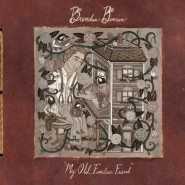 Brendan Benson
Brendan BensonMy Old Familiar Friend
Score: 44
Brendan Benson returned Tuesday from The Raconteurs collaborative with his newest solo album, My Old, Familiar Friend. But while the album starts with a dense, brilliantly active track that would provide stiff competition for anything on Consolers for the Lonely, the rest of the album never reaches the level of success he initially manages. As a result, Benson’s first solo album since 2005 is not quite the welcome back for which one would have hoped.
“A Whole Lot Better” starts the album off with a building epic, chock full of contrasting lines that somehow manage to fit nicely within the space provided by one another. It sometimes strays towards becoming cluttered, but never quite reaches that point. The only warning signals thrown are the occasional drastic transitions that don’t quite connect the two sections. But the full negative force of the mistreated transitions doesn’t become apparent until later tracks like “Garbage Day.” Similarly, while “A Whole Lot Better” managed to narrowly avoid clutter, the same is not true for, say, “Eye on the Horizon” in which, during the last section, parts are added on top of the then repetitive backing regardless of whether they fit in perfectly, creating an overly dense sound.
Benson’s vocals are anything but weak. In fact, they’re often one of the strongest parts of My Old, Familiar Friend. Benson’s voice is imbued with an obvious energy which carries it, and the overall tone of the music, through the album, preventing the album from becoming boring by creating an active thread through each track. The well-designed nuances at the edge of Benson’s words distinguish his vocals quite effectively, further developing the sound of the album. However, the album is not always vocally laudable, most notably on several of the duller tracks, including “Misery,” where Benson’s vocals cannot help but merge with the ineffably generic melodies. Rare artificial effects have much the same effect - they’ve obviously been chosen to effortlessly mark certain sections of the vocals, but, lacking the creativity necessary to do so, instead leave the listener slightly confused rather than interested.
Unfortunately, for each point of success in the vocals of My Old, Familiar Friend, there appears to be an equivalent point of mediocrity in the lyrics. Benson’s lyrics are often painfully bland, generic, and occasionally simply painful. Lines such as “I fell in love with you / And out of love with you / And back in love with you / All in the same day,” fit with the simple aesthetic for which Benson seems to be striving but don’t match up with the quality of even some of the less successful parts of the album.
When Benson succeeds lyrically, it’s on the rare occasions when he breaks free of his trite comfort zone and straight into inexplicable oddness: “I’m convinced that underneath that blonde hair / There’s a listening device planted there / And there’s a man who follows us everywhere / And we shouldn’t care.” But as Benson generally stays within the realm of awful wordplay (as with “Garbage Day“ ‘s “But if she throws her heart away / I’ll be there on garbage day”), nothing interesting can be expected.
Taken in its entirety, My Old, Familiar Friend varies highly between degrees of good and bad. Even while “Feel Like Taking You Home” avoids dullness through constant building and forward direction through the track, other tracks cannot help but sound like mistakes. “Garbage Day” intersperses what sounds like a keyboard’s “demo” feature with an ill-fitting, if much improved, second section. On “You Make a Fool Out of Me,” Benson unsuccessfully experiments with acoustic instruments, and even while Misery forces the album out of the slump created by the previous few tracks, the pop-rock inspired instrumentals that seem to be a significantly simpler version of what Benson had working for him on “A Whole Lot Better.” And even when Benson attempts to return to the sound he initially mastered, one element or another doesn’t quite make it, leaving “Feel Like Taking You Home,” in which the instrumentals don’t quite manage to support the vocals, and “Don’t Wanna Talk,” in which the vocals and lyrics struggle to stand up under the weight of the instrumentals.
With My Old, Familiar Friend, Brendan Benson has created an interesting, but flawed piece of work. Taking obvious inspiration from classic rock, Benson has created an engaging but often confusingly dull album, mixing strong elements such as his vocals and the more imaginative parts of the instrumentals with weaker parts (the lyrics and less interesting instrumental sections). When these all are combined, the generic sections have the disappointing effect of smothering many of the thought-provoking or creative ones, until all that’s left is a vague impression of the best parts. Benson hasn’t created an amazing album with My Old, Familiar Friend, but he has created something that takes some genuine consideration, its many weaknesses notwithstanding.
This post is tagged 40-49, Brendan Benson